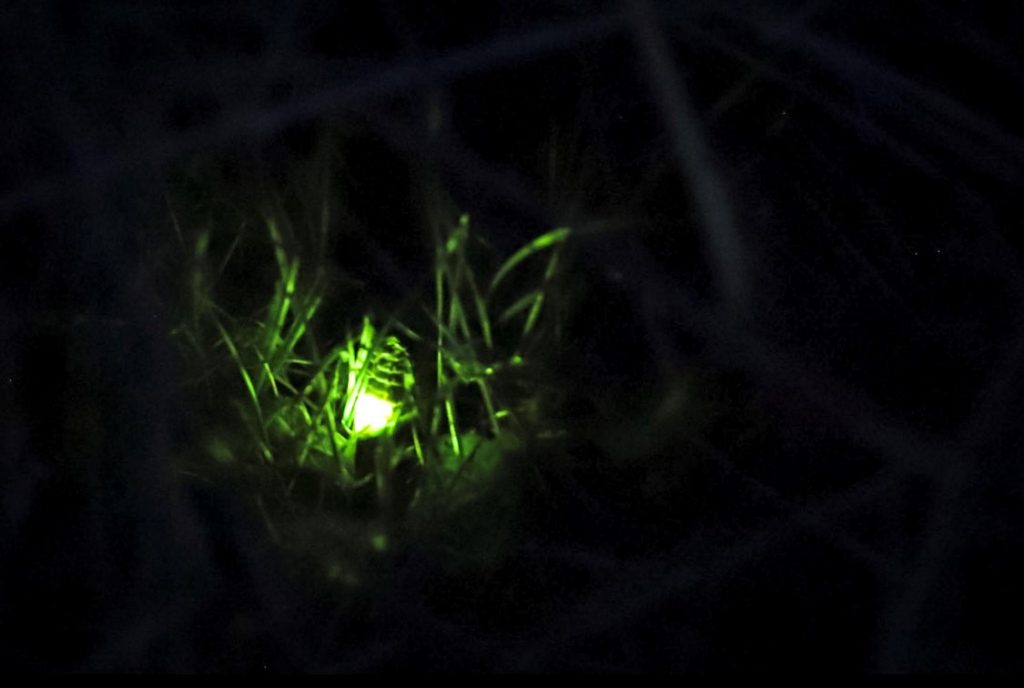
…a guest blog written by Dani Robertson, author and Dark Sky Officer for Snowdonia National Park.
A suffocatingly warm summers evening as you lay in bed, one leg on top of the covers and the windows open wide, trying to get the air to breathe into your bedroom so that you might finally get some sleep. As the sun’s rays fade away, your consciousness does too, and the sweet call of sleep has almost drawn you in when you hear it; a noise that refuses to be ignored. A whining and a fluttering of wings as they beat against the curtains, then the walls, then the tinny sound of frantic wing beats on the hot glass bulb. Your eyes spring open and you throw the covers off. You’ve left the landing light on again, and now every moth, daddy longlegs and gnat in a mile radius is dancing around the lampshade like it’s some ritualistic trance. And in a way, it is.
Insects are drawn to light at night in huge numbers, for various reasons, like a fatal and glowy Romeo and Juliet.

Since the beginning of life on Earth, there was only natural light; that came from the Sun, the Moon and the Stars. But then along came humans and in a little over 100 years we harnessed electricity to create billions of artificial Moons whose light encompasses the globe like an orange cling film, trapping everything underneath it in a lethal veil of light pollution.
Our insects (and even human brains) can’t tell the difference between natural and artificial light sources, and a third of insects attracted to a light will die, either through exhaustion or predation. Without our insects, we are done for. There is no life on this planet without them, but we are destroying habitat with light. Studies have shown that caterpillar larvae are more than 50% less numerous under street lit habitat and it is situations like this which are decimating our insect numbers. We have lost 60% of our winged insects in the last twenty years. We don’t have another twenty to waste.
We need to act on light pollution and we need to act now. That’s why my book ‘All Through the Night; Why Our Lives Depend on Dark Skies’, needs to be read by as many people as possible. It contains all you need to know about light pollution and most importantly, what you can do to help.
Luckily, we have a very simple solution to light pollution – turn off the lights!
In cases where there is a genuine need for lighting at night, there are measures and controls that we can put in place that reduce the impacts on our insects, other wildlife and even our own health and well-being. Everything you need to be a Dark Sky Defender is within these pages.
It is time to give darkness back to the creatures of the night.
 Dani Robertson, a Dark Sky Officer for Snowdonia National Park, is originally from Greater Manchester but moved to the Welsh countryside at an early age. She is prolific in conservation work, championing the darkness for all, and is a regular speaker at public outreach events. Her advocacy for night skies was recognised by the International Dark Sky Association in 2022, when she received the Dark Sky Defender Award.
Dani Robertson, a Dark Sky Officer for Snowdonia National Park, is originally from Greater Manchester but moved to the Welsh countryside at an early age. She is prolific in conservation work, championing the darkness for all, and is a regular speaker at public outreach events. Her advocacy for night skies was recognised by the International Dark Sky Association in 2022, when she received the Dark Sky Defender Award.
All Through the Night is her first book and will equip readers with the tools for defending our skies. She lives in Wales with her husband and their two dogs. She is a keen surfer, photographer and stargazer and has featured on/in: The Guardian; BBC Countryfile; ITV’s Wonders of the Coast Path; ITV Carol Vorderman – Closer to Home; BBC Weather Man Walking; S4C; and BBC Radio Cymru.
Main image credit: Glow-worm, Malltraeth ©️ Dani Robertson

